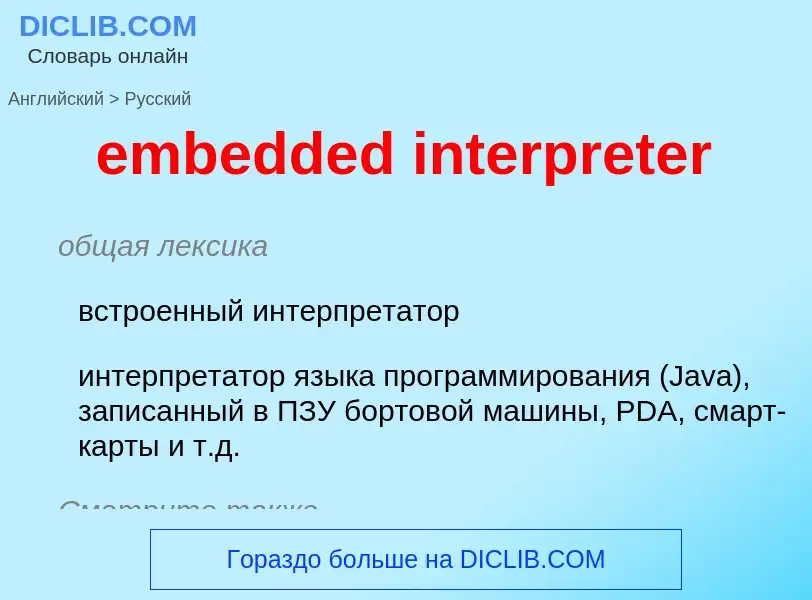Перевод и анализ слов искусственным интеллектом ChatGPT
На этой странице Вы можете получить подробный анализ слова или словосочетания, произведенный с помощью лучшей на сегодняшний день технологии искусственного интеллекта:
- как употребляется слово
- частота употребления
- используется оно чаще в устной или письменной речи
- варианты перевода слова
- примеры употребления (несколько фраз с переводом)
- этимология
embedded interpreter - перевод на Английский
общая лексика
встроенный интерпретатор
интерпретатор языка программирования (Java), записанный в ПЗУ бортовой машины, PDA, смарт-карты и т.д.
Смотрите также
общая лексика
интерпретируемый язык
язык программирования, предназначенный для исполнения интерпретатором
Смотрите также
[i'væljueitə]
нефтегазовая промышленность
программа проверки
блок оценивания
регистр оценки
средства оценки
Смотрите также
существительное
общая лексика
оценщик
общая лексика
встроенная [встраиваемая] система
компьютерная система работающая совместно с другим оборудованием и размещаемая с ним либо в одном конструктиве, либо внутри данного оборудования
общая лексика
промышленный компьютер, промышленный ПК
компьютер в специальном конструктивном исполнении, обеспечивающем его работоспособность в тяжелых средах (Syn industrial PC). Различают: dust-protected - пылезащищённые
Смотрите также
общая лексика
встраиваемый [встроенный] компьютер
компьютер, используемый как узел устройства
Смотрите также
Определение
Википедия

In computer science, an interpreter is a computer program that directly executes instructions written in a programming or scripting language, without requiring them previously to have been compiled into a machine language program. An interpreter generally uses one of the following strategies for program execution:
- Parse the source code and perform its behavior directly;
- Translate source code into some efficient intermediate representation or object code and immediately execute that;
- Explicitly execute stored precompiled bytecode made by a compiler and matched with the interpreter Virtual Machine.
Early versions of Lisp programming language and minicomputer and microcomputer BASIC dialects would be examples of the first type. Perl, Raku, Python, MATLAB, and Ruby are examples of the second, while UCSD Pascal is an example of the third type. Source programs are compiled ahead of time and stored as machine independent code, which is then linked at run-time and executed by an interpreter and/or compiler (for JIT systems). Some systems, such as Smalltalk and contemporary versions of BASIC and Java may also combine two and three. Interpreters of various types have also been constructed for many languages traditionally associated with compilation, such as Algol, Fortran, Cobol, C and C++.
While interpretation and compilation are the two main means by which programming languages are implemented, they are not mutually exclusive, as most interpreting systems also perform some translation work, just like compilers. The terms "interpreted language" or "compiled language" signify that the canonical implementation of that language is an interpreter or a compiler, respectively. A high-level language is ideally an abstraction independent of particular implementations.





![Embedded system [[text user interface]] using MicroVGA<ref group="nb" name="MicroVGA">For more details of MicroVGA see this [http://www.microvga.com/pdf/uvga-text-ds.pdf PDF].</ref> Embedded system [[text user interface]] using MicroVGA<ref group="nb" name="MicroVGA">For more details of MicroVGA see this [http://www.microvga.com/pdf/uvga-text-ds.pdf PDF].</ref>](https://commons.wikimedia.org/wiki/Special:FilePath/MicroVGA TUI demoapp.jpg?width=200)
![A close-up of the SMSC LAN91C110 (SMSC 91x) chip, an embedded [[Ethernet]] chip A close-up of the SMSC LAN91C110 (SMSC 91x) chip, an embedded [[Ethernet]] chip](https://commons.wikimedia.org/wiki/Special:FilePath/SMSC LAN91C110 ethernet chip.jpg?width=200)
